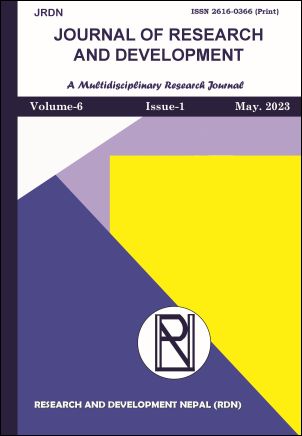Knowledge and Practice on Covid-19 among Rural Schools’ Teachers and Students of Dhankuta District, Nepal
DOI:
https://doi.org/10.3126/jrdn.v6i01.55239Keywords:
Covid-19, knowledge and practice, preventive measures, cross sectionalAbstract
A novel corona virus (nCoV) was recognized on seven January 2020 and was temporarily named “2019-nCoV”. It was subsequently named the “Covid-19 virus globally. The objective of the study is to assess the knowledge and the preventive practice on Covid-19 among teachers and students of Mahalaxmi municipality in Dhankuta. Descriptive analytical cross-sectional design was used. A census method was used to choose the respondents. A semi- structured questionnaire was used to collect the data among 387 respondents. Frequency, percentage, mean, median and standard deviation were used to assess the knowledge and preventive practice on Covid-19 with teachers and students.. Inferential analysis i.e. multivariate logistic regression was used to find the relationship between dependent and selected demographic variables. Half (50.6%) of the respondents had good level of knowledge on Covid-19. Two-forth (50.4%) of respondents had poor practice on Covid-19 and less than two-forth (49.6%) of respondents had good practice. Multivariate analysis shows that there is association among levels of practice with ethnicity (p=0.007; aOR =0.576; CI=0.385-.862) and mother education (p=0.003; aOR =1.228; CI=1.072-.1.407).There is significant association between level of practice and ethnicity (p=0.004; aOR=1.810; CI=1.202- 2.726) and mother’s education (p=0.002; aOR=0.804; CI=0.700-0.923). The study concluded that nearly half (49.4%) had still poor level of knowledge and more two-forth (50.4%) of the respondents had poor level of practice on Covid-19 so awareness programmed should be conducted to enhance the Knowledge and practice of teachers and students of Mahalaxmi municipality.




